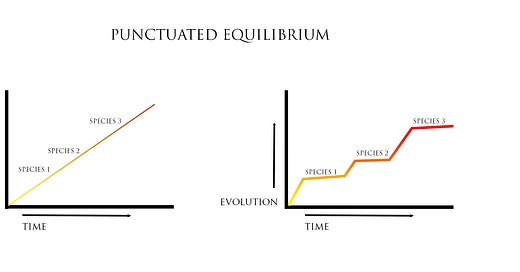Our Theory of Change
The World’s First ToC Informed by Punctuated Equilibrium

The audio above is an AI-generated 'podcast' crafted with careful prompting and highly selected data sources, which you can view here: https://notebooklm.google.com/notebook/4ed9611b-ba5f-4eca-9927-71f3aceed306Most Theories of Change are comforting lies.
They promise neat, predictable progressions: set a goal, follow the steps, achieve the outcome. Linear thinking for a non-linear world.
But that’s not how systemic transformation happens. Not at the species level. Not for societies. And certainly not for the complex systems crumbling around us.
When paleontologists Niles Eldredge and Stephen Jay Gould studied fossil layers in 1972, they didn’t find Darwin’s gradual, continuous transformation. They found long periods of stasis interrupted by rapid bursts of change — punctuated equilibrium.
The Punctuated Equilibrium Theory of Change transcends this convenient fiction of linear change. It forces us to confront an inconvenient truth: the kind of meaningful change called for today doesn’t happen smoothly, gradually, or on our preferred timeline.
It happens in a flash.
Long periods of relative stability that gradually deteriorate — the boiling frog — suddenly interrupted by rapid, evolutionary phase shifts where challenges evaporate.
This isn’t idealism. It’s recognizing a pattern that repeats.
When we study how change actually unfolds — in biological evolution, policy development, or civilizational cycles — we discover a rhythm.
Stasis (long periods of stability).
Crisis (like we see unfolding around us).
Transformation (about emerge right where you live).
New equilibrium.
Not a straight line, but a cadence.
The metacrisis isn’t a collection of problems to be solved with our existing toolkit. It’s a punctuation moment — a signal that our current paradigm has exhausted itself.
Our institutions aren’t designed for this reality. Our leaders don’t acknowledge it. But municipalities — those human-scale laboratories of governance — are ideally suited. Some are already adapting to it.
They’re synthesizing the technological infrastructure of our digital age with the ecological wisdom of bioregionalism. They’re creating the prototypes for what comes next.
The question isn’t whether transformational change will happen. It’s whether we’ll consciously participate in shaping it.
Will we cling to outdated linear models of incremental improvement? Or will we embrace the evolutionary pattern of punctuated change and ride the wave of transformation?
The metacrisis isn’t merely a threat. It’s an opportunity to leap forward — from extractive to regenerative, from centralized to networked, from stagnation to synthesis.
This moment of punctuation demands non-linear Theories of Change.
They don’t exist.
Until now.


